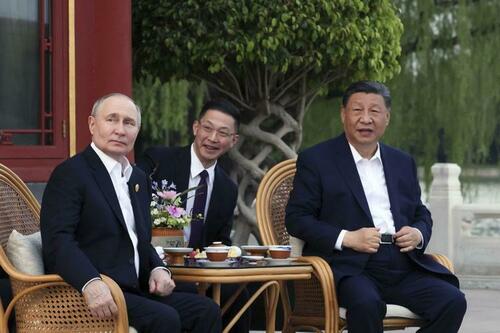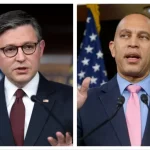
Authored by Ray McGovern via Consortium News
Chinese President Xi Jinping’s extremely warm reception of President Vladimir Putin yesterday in Beijing sealed the increasingly formidable Russia-China strategic relationship. It amounts to a tectonic shift in the world balance of power.
The Russia-China entente also sounds the death knell for attempts by U.S. foreign policy neophytes to drive a wedge between the two countries. The triangular relationship has become two-against-one, with serious implications, particularly for the war in Ukraine. If US President Joe Biden’s foreign policy geniuses remain in denial, escalation is almost certain.

In a pre-visit interview with Xinhua, Putin noted the “unprecedented level of strategic partnership between our countries.” He and Xi have met more than 40 times in person or virtually. In June 2018, Xi described Putin as “an old friend of the Chinese people” and, personally, his “best friend.”
For his part, Putin noted Thursday that he and Xi are “in constant contact to keep personal control over all pressing issues on the Russian-Chinese and international agenda.” Putin brought along Defense Minister Andrey Belousov as well as veterans like Foreign Minister Sergey Lavrov and key business leaders.
Joint Statements Matter
Xi and Putin signed a strong joint statement Thursday, similar to the extraordinary one the two issued on Feb. 4, 2022, in Beijing. It portrayed their relationship as “superior to political and military alliances of the Cold War era. Friendship between the two States has no limits, there are no ‘forbidden’ areas of cooperation…”
The full import of that statement did not hit home until Putin launched the Special Military Operation into the Donbass three weeks later. China’s muted reaction shocked most analysts, who had dismissed the possibility that Xi would give “best friend” Putin, in effect, a waiver on China’s bedrock policy of non-interference abroad.
In the following weeks, official Chinese statements made clear that the principles of Westphalia had taken a back seat to “the need for every country to defend its core interests” and to judge each situation “on its own merits.”
Nuclear War
Thursday’s statement expressed concern over “increased strategic risks between nuclear powers” — referring to continued escalation of the war between NATO-supported Ukraine and Russia.
It condemns “the expansion of military alliances and creation of military bridgeheads close to the borders of other nuclear powers, particularly with the advanced deployment of nuclear weapons and their means of delivery, as well as other items.”
Putin has undoubtedly briefed Xi on the U.S. missile sites already in Romania and Poland that can launch what Russians call “offensive strike missiles” with flight time to Moscow of less than 10 minutes. Putin surely has told Xi about the inconsistencies in U.S. statements regarding intermediate-range nuclear missiles.
For example, Xi is aware — just as surely as consumers of Western media are unaware — that during a Dec. 30, 2021, telephone conversation, Biden assured Putin that “Washington had no intention of deploying offensive strike weapons in Ukraine.”
There was rejoicing in the Kremlin that New Years’ Eve, since Biden’s assurance was the first sign that Washington might acknowledge Russia’s security concerns. Indeed, Biden addressed a key issue in at least five of the eight articles of the Russian draft treaty given to the U.S. on Dec. 17, 2021. Russian rejoicing, however, was short-lived.
There has remained much speculation over whether the two leaders' respective translators were actually also carrying the 'nuclear footballs' while in Harbin:
Putin and Xi have been shadowed the entire visit by their respective guys presumably lugging their nuclear footballs. I think this is a new look for Russia and China. The message sent is about as heavy as it gets. https://t.co/adSDnSMoJy
— Jeff Wells (@JeffWellsRigInt) May 16, 2024
Foreign Minister Lavrov revealed last month that when he met Antony Blinken in Geneva in January 2022, the U.S. secretary of state pretended he’d not heard of Biden’s undertaking to Putin on Dec. 30, 2021. Rather, Blinken insisted that U.S. medium-range missiles could be deployed in Ukraine, and only that the U.S. might be willing to limit their number, Lavrov said.
The Mother of All Miscalculations
When Biden took office in 2021, his advisers assured him that he could play on Russia’s fear (sic) of China and drive a wedge between them. This became embarrassingly clear when Biden indicated what he had told Putin during their Geneva summit on June 16, 2021.
That meeting gave Putin confirmation that Biden and his advisers were stuck in a woefully outdated appraisal of Russia-China relations.
Read the rest at Consortium News
Authored by Ray McGovern via Consortium News
Chinese President Xi Jinping’s extremely warm reception of President Vladimir Putin yesterday in Beijing sealed the increasingly formidable Russia-China strategic relationship. It amounts to a tectonic shift in the world balance of power.
The Russia-China entente also sounds the death knell for attempts by U.S. foreign policy neophytes to drive a wedge between the two countries. The triangular relationship has become two-against-one, with serious implications, particularly for the war in Ukraine. If US President Joe Biden’s foreign policy geniuses remain in denial, escalation is almost certain.

In a pre-visit interview with Xinhua, Putin noted the “unprecedented level of strategic partnership between our countries.” He and Xi have met more than 40 times in person or virtually. In June 2018, Xi described Putin as “an old friend of the Chinese people” and, personally, his “best friend.”
For his part, Putin noted Thursday that he and Xi are “in constant contact to keep personal control over all pressing issues on the Russian-Chinese and international agenda.” Putin brought along Defense Minister Andrey Belousov as well as veterans like Foreign Minister Sergey Lavrov and key business leaders.
Joint Statements Matter
Xi and Putin signed a strong joint statement Thursday, similar to the extraordinary one the two issued on Feb. 4, 2022, in Beijing. It portrayed their relationship as “superior to political and military alliances of the Cold War era. Friendship between the two States has no limits, there are no ‘forbidden’ areas of cooperation…”
The full import of that statement did not hit home until Putin launched the Special Military Operation into the Donbass three weeks later. China’s muted reaction shocked most analysts, who had dismissed the possibility that Xi would give “best friend” Putin, in effect, a waiver on China’s bedrock policy of non-interference abroad.
In the following weeks, official Chinese statements made clear that the principles of Westphalia had taken a back seat to “the need for every country to defend its core interests” and to judge each situation “on its own merits.”
Nuclear War
Thursday’s statement expressed concern over “increased strategic risks between nuclear powers” — referring to continued escalation of the war between NATO-supported Ukraine and Russia.
It condemns “the expansion of military alliances and creation of military bridgeheads close to the borders of other nuclear powers, particularly with the advanced deployment of nuclear weapons and their means of delivery, as well as other items.”
Putin has undoubtedly briefed Xi on the U.S. missile sites already in Romania and Poland that can launch what Russians call “offensive strike missiles” with flight time to Moscow of less than 10 minutes. Putin surely has told Xi about the inconsistencies in U.S. statements regarding intermediate-range nuclear missiles.
For example, Xi is aware — just as surely as consumers of Western media are unaware — that during a Dec. 30, 2021, telephone conversation, Biden assured Putin that “Washington had no intention of deploying offensive strike weapons in Ukraine.”
There was rejoicing in the Kremlin that New Years’ Eve, since Biden’s assurance was the first sign that Washington might acknowledge Russia’s security concerns. Indeed, Biden addressed a key issue in at least five of the eight articles of the Russian draft treaty given to the U.S. on Dec. 17, 2021. Russian rejoicing, however, was short-lived.
There has remained much speculation over whether the two leaders’ respective translators were actually also carrying the ‘nuclear footballs’ while in Harbin:
Putin and Xi have been shadowed the entire visit by their respective guys presumably lugging their nuclear footballs. I think this is a new look for Russia and China. The message sent is about as heavy as it gets. https://t.co/adSDnSMoJy
— Jeff Wells (@JeffWellsRigInt) May 16, 2024
Foreign Minister Lavrov revealed last month that when he met Antony Blinken in Geneva in January 2022, the U.S. secretary of state pretended he’d not heard of Biden’s undertaking to Putin on Dec. 30, 2021. Rather, Blinken insisted that U.S. medium-range missiles could be deployed in Ukraine, and only that the U.S. might be willing to limit their number, Lavrov said.
The Mother of All Miscalculations
When Biden took office in 2021, his advisers assured him that he could play on Russia’s fear (sic) of China and drive a wedge between them. This became embarrassingly clear when Biden indicated what he had told Putin during their Geneva summit on June 16, 2021.
That meeting gave Putin confirmation that Biden and his advisers were stuck in a woefully outdated appraisal of Russia-China relations.
Read the rest at Consortium News
Loading…






